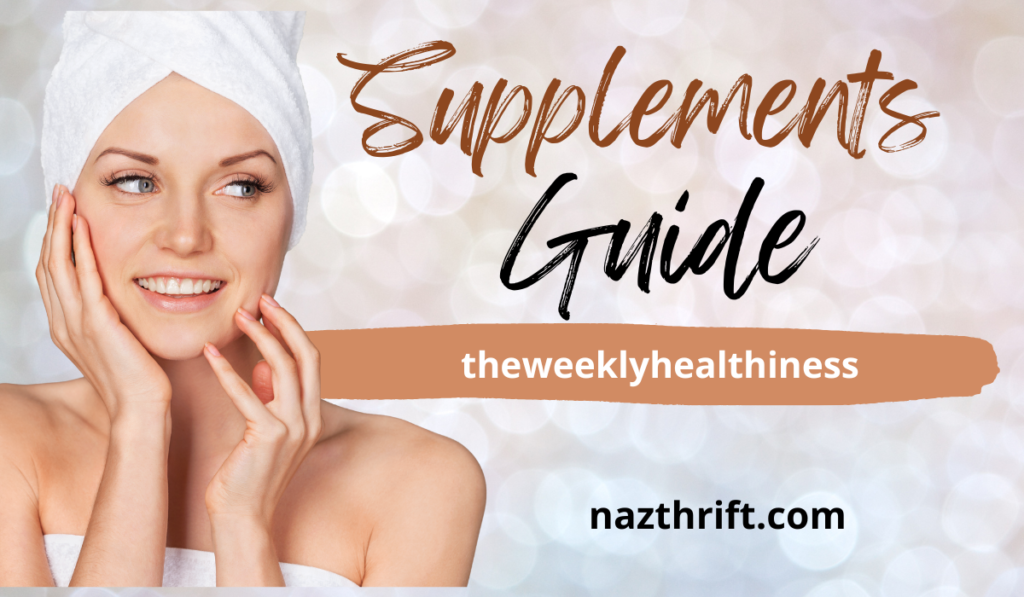In today’s world of wellness trends and endless health advice, finding the right information about supplements can be overwhelming. That’s where this supplements guide theweeklyhealthiness comes in. Designed as your one-stop resource, this guide breaks down everything you need to know about dietary supplements — from the basics to advanced insights — so you can make informed decisions for your health.
Whether you’re new to supplements or looking to refine your regimen, this comprehensive guide is here to help.
What Is theweeklyhealthiness Supplements Guide?
The supplements guide theweeklyhealthiness is designed to help readers navigate the often confusing world of vitamins, minerals, and herbal products. It’s built on the principle that supplements should complement a healthy lifestyle—not replace it.
This guide covers:
✅ The most popular supplements and their benefits
✅ How to choose quality products
✅ Common myths and risks
✅ Practical tips for integrating supplements into daily life
By the end of this guide, you’ll feel confident in selecting supplements that align with your health goals.
Why Consider Supplements?
Even with the best intentions, most people struggle to get all the essential nutrients their bodies need from food alone. Busy schedules, dietary restrictions, soil nutrient depletion, and aging can all contribute to nutrient gaps.
Here’s why many people turn to supplements:
- Fill nutritional gaps – Even healthy diets can lack critical vitamins and minerals.
- Support specific health needs – From immunity boosts to joint support, targeted supplements can help.
- Manage deficiencies – Common ones include vitamin D, B12, iron, and magnesium.
- Enhance performance – Athletes often use protein powders and creatine for recovery and strength.
The supplements guide theweeklyhealthiness takes these factors into account to give you a balanced perspective.
Types of Supplements Explained

1. Vitamins and Minerals
These are the most common supplements and include:
- Vitamin D – Supports bone health and immunity.
- Magnesium – Helps with muscle relaxation and energy production.
- Iron – Vital for transporting oxygen in the blood.
2. Herbal and Botanical Products
Plant-based supplements like turmeric, ashwagandha, and ginseng have been used for centuries.
3. Probiotics and Enzymes
Beneficial bacteria and digestive enzymes support gut health and nutrient absorption.
4. Essential Fatty Acids
Omega-3 fatty acids from fish oil or algae oil promote heart and brain health.
The supplements guide theweeklyhealthiness provides in-depth insights on each category so you can understand their roles.
How to Choose Supplements Wisely
✅ Look for Quality Standards
- Opt for products with third-party testing (e.g., USP, NSF, ConsumerLab).
- Check for clear labeling and transparency in ingredient sourcing.
✅ Assess Your Individual Needs
- Age, gender, lifestyle, and existing health conditions all influence what supplements are right for you.
✅ Avoid Mega-Dosing
Taking too much of certain nutrients (like vitamin A or iron) can be harmful.
As outlined in the supplements guide theweeklyhealthiness, quality and moderation are key.
Common Myths Debunked
❌ Myth 1: Supplements Can Replace Food
A healthy, balanced diet should always be your foundation. Supplements are there to support, not substitute.
❌ Myth 2: All Supplements Are Safe
“Natural” doesn’t always mean risk-free. Some herbs and vitamins can interact with medications or cause side effects.
❌ Myth 3: More Is Better
Overloading on supplements can lead to toxicity and health problems.
The supplements guide theweeklyhealthiness emphasizes evidence-based use over hype or trends.

Risks of Taking Supplements
While most supplements are safe when used responsibly, potential risks include:
- Drug interactions
- Allergic reactions
- Contamination in unregulated products
To minimize these risks:
✅ Consult a healthcare professional before starting any new supplement.
✅ Stick to reputable brands and follow dosage recommendations.
Whole Foods vs. Supplements: Finding the Balance
It’s always best to get nutrients from whole foods because they contain a complex mix of fiber, antioxidants, and phytonutrients that work synergistically.
However, supplements can fill in gaps where diet alone falls short. The supplements guide theweeklyhealthiness encourages focusing on:
- Fresh fruits and vegetables
- Lean proteins
- Whole grains
- Healthy fats
Then, strategically add supplements as needed.
Building Your Personalized Supplement Routine
Here’s a simple checklist to get started:
✅ Step 1: Identify your goals (energy, immunity, gut health, etc.)
✅ Step 2: Review your diet for potential gaps
✅ Step 3: Consult a doctor or dietitian
✅ Step 4: Choose high-quality products
✅ Step 5: Monitor your response and adjust as needed
The supplements guide theweeklyhealthiness provides tools to help you customize your plan safely.
For science-backed information, visit:
🌐 National Institutes of Health – Office of Dietary Supplements
This government site is a high-authority resource for researching vitamins, minerals, and herbal products.
Final Thoughts: Your Health, Your Choice
The world of supplements is vast and sometimes confusing. But with the help of this supplements guide theweeklyhealthiness, you now have a clear roadmap to make informed decisions.
Remember: Supplements are not magic pills—they work best as part of a healthy, balanced lifestyle that includes proper nutrition, regular exercise, and sufficient rest.
Start slow, stay informed, and focus on quality over quantity for long-term health success.

